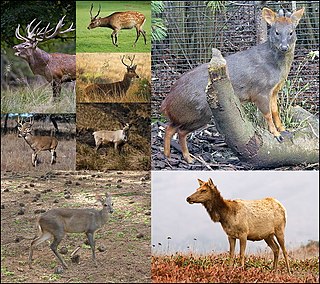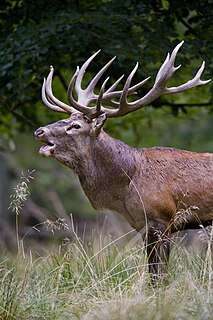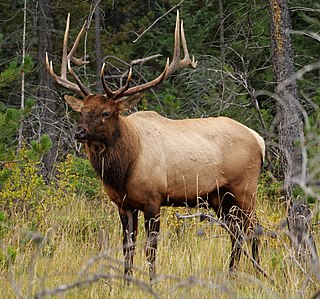An antler is the large horn-like appendage of deer or related species.
Contents
Antler or Antlers may also refer to:
An antler is the large horn-like appendage of deer or related species.
Antler or Antlers may also refer to:

Deer or true deer are hoofed ruminant mammals forming the family Cervidae. The two main groups of deer are the Cervinae, including the muntjac, the elk (wapiti), the red deer, and the fallow deer; and the Capreolinae, including the reindeer (caribou), white-tailed deer, the roe deer, and the moose. Male deer of all species as well as female reindeer, grow and shed new antlers each year. In this they differ from permanently horned antelope, which are part of a different family (Bovidae) within the same order of even-toed ungulates (Artiodactyla).

Antlers are extensions of an animal's skull found in members of the Cervidae (deer) family. Antlers are a single structure composed of bone, cartilage, fibrous tissue, skin, nerves, and blood vessels. They are generally found only on males, with the exception of reindeer/caribou. Antlers are shed and regrown each year and function primarily as objects of sexual attraction and as weapons.
Huron may refer to:
Rush(es) may refer to:
Imperial is that which relates to an empire, emperor, or imperialism.
Meow is an imitative word for a sound made in cat communication.
Drake may refer to:
Black Mountain may refer to:
Red is a color.
A hotel is an establishment that provides paid lodging on a short-term basis.
The Argo is the ship captained by Jason in Greek mythology.
Brock may refer to:
Clover is a genus of small, trifoliate plants.
Frontier is a geographical term referring to areas near or beyond a boundary, or of a different nature.

The elk, also known as the wapiti, is one of the largest species within the deer family, Cervidae, and one of the largest terrestrial mammals in its native range of North America, as well as Central and East Asia. The common name elk, used in North America, creates confusion because the larger Alces alces, which is called moose in North America, is also called elk in British English, and related names in other European languages. The name "wapiti" is sometimes used in North America for Cervus canadensis. It originates from the Shawnee and Cree word waapiti, meaning 'white rump'.
A carrot is a vegetable.
El Dorado is a mythical city of gold.

The Antlers is a Wyndham Hotel located in Colorado Springs, Colorado. It opened in 1967 and is the third hotel of that name on the same site.
The Hole in the Horn Buck is officially listed as the second largest non-typical white-tailed deer of all time by the Boone and Crockett Club. The buck’s antlers score 328 2/8 non-typical points. The name of the buck derives from the mysterious hole in the buck’s right antler. It was later claimed by eyewitness, George Winters, to be caused from a piece of chain-link fence that pierced the antler shortly before it died.